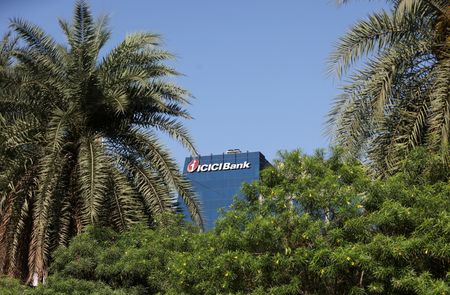By Chris Thomas and Navamya Ganesh Acharya
BENGALURU (Reuters) – India’s ICICI Securities on Thursday secured the votes needed to delist its stock, capping a dramatic week that saw backlash from some unhappy retail investors and reported attempts by parent ICICI Bank to sway votes.
About 71.9% of the brokerage’s minority shareholders voted in favour of the delisting and merger with ICICI Bank, exceeding the regulatory requirement of a two-thirds majority, despite stiff opposition from some investors.
Local media had reported earlier this week that ICICI Bank made multiple attempts to persuade ICICI Securities’ shareholders to vote in favour of the delisting. Reuters has not independently confirmed the details of the report.
ICICI Bank, which holds roughly 75% stake in the brokerage and whose vote is not considered, said on Thursday that its shareholder outreach was “important” to explain the proposal and maximise participation, and was not done to sway voters.
Last year, ICICI Bank said it would buy the remaining stake in a share-swap deal, sparking a jump in shares which raised the implied offer price to about 726 rupees as of Wednesday’s close.
At this rate, ICICI Bank would pay about 59 billion rupees ($707.9 million) for the stake, at a roughly 2% discount to ICICI Securities’ Wednesday close of 741.70 rupees.
However, some funds and retail investors have criticised the deal for being undervalued.
Quantum Asset Management, which has a 0.21% stake in ICICI Securities and voted against the delisting, estimates the offer price should be around 940 rupees per share based on the lowest multiple among the company’s listed peers.
“The dynamics have changed since they announced the delisting. Ideally, they should have withdrawn the offer and come up with a revised offer, which has not happened,” said George Thomas, an associate fund manager at Quantum Asset.
Shares of ICICI Securities lost 1.9% on Thursday, while ICICI Bank rose 0.9%.
Around 84% of institutional public investors voted in favour of the delisting, while just 32% of non-institutional public shareholders approved the proposal.
These shareholder categories hold 16.68% and 8.55% in the company, respectively.
ICICI Securities’ largest public shareholder, Norges Bank Investment Management, voted in favour of the deal.
ICICI Securities’ stock has risen about 43% during its six-year run as a public company, while ICICI Bank’s shares have risen around four-fold during the period.
($1 = 83.3360 Indian rupees)
(This story has been refiled to correct a typo in the headline)
(Additional reporting by Hritam Mukherjee in Bengaluru; Editing by Varun H K)










